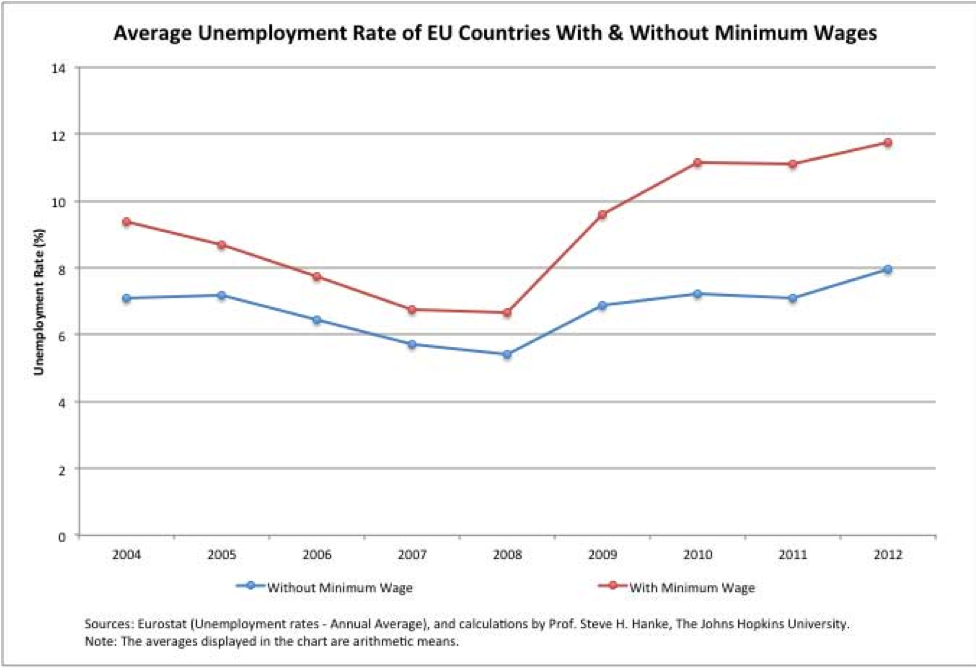The sounds of the political drums in favor of raising the minimum wage are deafening. Although the idea of hiking up the minimum wage enjoys wide support among the populace (a 2013 Gallup showed that 76 percent of Americas support raising the federal minimum wage), it will substantially hinder the very goals it seeks to accomplish. Namely, it will burden the most vulnerable segments of our society, such as low-skill workers, the youth and minorities. Instead of helping these people, raising the minimum wage will unfairly burden them by hampering job creation, pushing them into unemployment and preventing teens and young adults from entering the workforce.
Raising the minimum wage raises serious questions regarding the utilitarian ethics of sacrificing the interests of the few to benefit the many; by this, I’m referring to those who will be pushed into unemployment as opposed to those who will keep their jobs and make more money. Although a recent report by the Congressional Budget Office found that raising the minimum wage to $10.10 by 2016 would move approximately 900,000 above the poverty line, it also predicted that this increase would reduce employment by 500,000 workers by the end of 2016.
Should we sacrifice the interests of the 500,000 for the sake of the 900,000? Although the enlightenment-era philosopher Jeremy Bentham would argue that the summum bonum, or the “highest good” can be accomplished by policies that produce the greatest good for the greatest number of people, I would argue that this line of logic dangerously places the few at the peril of the whims of many.
Additionally, the means employed here (forcing businesses to foot the bill) to reach the goal of establishing a higher standard of living for the poor is unethical for the same reason.
Although the aim of increasing the standard of living is desirable, the means used to actualize this taints the end goal by transforming it into the fruit of the poisonous tree. If we are the ones demanding for higher wages, then we also need to be the ones paying for it.
Luckily, there is a mechanism that employs more ethical means to provide for those who occupy the lowest rung of America’s socio-economic ladder: Earned Income Tax Credit (EITC).
It operates by providing a tax refund for low-income workers, especially those with children. According to a report by the IRS, the EITC successfully lifted 7 million Americans above the poverty line in 2009, which is far greater than the 900,000 estimated for President Obama’s $10.10 plan.
EITC is also substantially more effective at targeting those who so desperately need economic relief. Many of those who stand to benefit from minimum wage increases are not exactly in dire economic straits; for example, Bill Gates’ son would receive the monetary stimulus under minimum wage laws. In contrast, EITC targets only the bottom wage earners who make less than about $46,000 per year (this is the maximum possible if you have three or more children); furthermore, the payout adjusts based on marital status and the number of dependents.
Expanding EITC, especially for those without children, would be a much more effective and ethical way of alleviating poverty than minimum wage increases.
Minimum wage laws – while advertised under the banner of income inequality, social justice and fairness – do not meet the mark; furthermore, minimum wage laws compromise the very goals they seek to obtain. Instead of raising the bar for the minimum standard of living, minimum wage laws push individuals into unemployment, hamper job creation and hinder the ability of teens to enter the workforce.





Your question: “Should we sacrifice the interests of 500,000 for the sake of 900,000?” What you meant to say was: “Should we sacrifice the interests if 500,000 for the sake if 400,000?” …hence 400,000 would be losing their jobs by reflection of the statistics you provided…. As an aspiring writer it’s important you understand statistics and works you cite in your own creations. No disrespect to you, you’re an intelligent person. As someone who seems to be against government intervention in the private sector it is interesting that you would be against raising the minimum wage. Think about all the people on minimum wage receiving government subsidies. These handouts are coming out of the taxpayer’s pocket. By raising the minimum wage those who were forced out of their jobs would be forced to find work, make jobs, become educated, and in return our economy will hopefully stimulate itself. Though, by underpaying our working residents and citizens our government is forced to step in. With our population growing by the year that only leaves more subsidies to eventually be handed out unless we can get our workers into decent and well paid jobs. I’d be interested to hear your opinion.